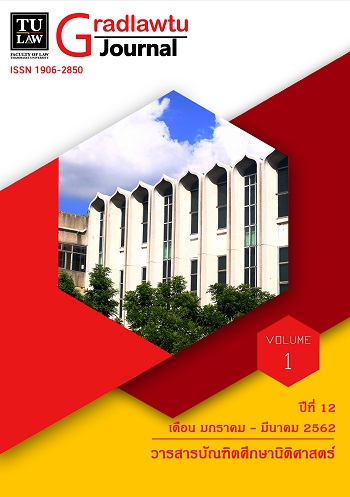NECESSITY DOCTRINE AND NON-PRECLUDED MEASURES PROVISIONS IN BILATERAL INVESTMENT TREATIES AS INVESTMENT PROTCTION IN EXCEPTIONAL CIRCUMSTANCES IN THAILAND
Main Article Content
Abstract
Necessity doctrine and non-precluded measures (NPM) provisions in bilateral investment treaties were studied as investment protection in exceptional circumstances in Thailand. NPM and exception provisions serve as safeguards to protect host state interests from threats caused by exceptional circumstances. As an exception to bilateral investment treaties, they preserve host states from being liable for damages to foreign investors while maintaining policy spaces. To determine NPM, international investment arbitrators apply the concept of necessity derived from international customary law and World Trade Organization (WTO) rules. The latter are seen as an example of the need for WTO law in investment activity, to develop international investment law principles and conditions in future. In December 2016, the Thai government announced its intention to close the Kingdom’s only active gold mine by the end of the year due to environmental concerns. This and related measures led to submission of a dispute for international investment arbitration by an affected foreign investor, claiming compensation. This case study applies to the use of general exceptions in the investment context and the importance of including NPM and exception provisions in Thai international investment agreements to best protect and maintain the Kingdom’s essential interests.
Article Details
บทความหรือข้อความคิดเห็นใด ๆ ที่ปรากฏในวารสารบัณฑิตศึกษานิติศาสตร์เป็นวรรณกรรมของผู้เขียนโดยเฉพาะคณะนิติศาสตร์ มหาวิทยาลัยธรรมศาสตร์ และบรรณาธิการไม่จำเป็นต้องเห็นด้วย
References
Amit Kumar SINHA. “Non-Precluded Measures Provisions in Bilateral Investment Treaties of South Asian Countries.” Asian Journal of International Law 7. (2017) : 239.
Andrew D. Mitchell and Caroline Henckels. “Variations on Theme: Comparing the Concept of “Necessity” in International Investment Law and WTO Law.” Chicago Journal of International Law 14. (January 2013) : 108.
Cynthia C. Galvez. “Necessity, Investor Rights, and State Sovereignty for NAFTA Investment Arbitration.” Cornell International Law Journal 46. (Winter 2003) : 149.
David Collins. “The line of equilibrium: improving the legitimacy of investment treaty arbitration through the application of the WTO’s general exceptions.” Arbitration International 32. (2016) : 583.
Jürgen Kurtz, “Adjudging the Exceptional at International Investment Law: Security, Public Order and Financial Crisis.” Intl & Comp L Q 59. (2010) : 330.
Otabek Ismailov. “INTERACTION OF INTERNATIONAL INVESTMENT AND TRADE REGIMES ON INTERPRETING TREATY “NECESSITY” CLAUSES: CONVERGENCE OR DIVERGENCE?.” Georgetown Journal of International Law 48. (2017) : 516.
William W. Burke-White and Andreas von Staden. “Investment Protection in Extraordinary Times: The Interpretation and Application of Non-Precluded Measures Provisions in Bilateral Investment Treaties.” Virginia Journal of International Law 48. (2008) : 309.

